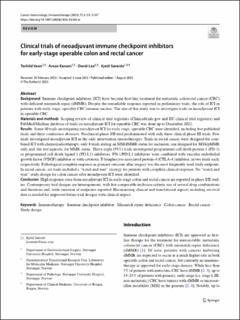| dc.contributor.author | Veen, Torhild | |
| dc.contributor.author | Kanani, Arezo | |
| dc.contributor.author | Lea, Dordi | |
| dc.contributor.author | Søreide, Kjetil | |
| dc.date.accessioned | 2023-10-12T10:48:08Z | |
| dc.date.available | 2023-10-12T10:48:08Z | |
| dc.date.created | 2023-09-27T11:49:36Z | |
| dc.date.issued | 2023 | |
| dc.identifier.issn | 0340-7004 | |
| dc.identifier.uri | https://hdl.handle.net/11250/3096044 | |
| dc.description.abstract | Background: Immune checkpoint inhibitors (ICI) have become first-line treatment for metastatic colorectal cancer (CRC) with deficient mismatch repair (dMMR). Despite the remarkable response reported in preliminary trials, the role of ICI in patients with early-stage, operable CRC remains unclear. The aim of this study was to investigate trials on neoadjuvant ICI in operable CRC.
Materials and methods: Scoping review of clinical trial registries (Clinicaltrials.gov and EU clinical trial registers) and PubMed/Medline database of trials on neoadjuvant ICI for operable CRC was done up to December 2022.
Results: Some 40 trials investigating neoadjuvant ICI for early-stage, operable CRC were identified, including five published trials and three conference abstracts. Preclinical phase I/II trial predominated with only three clinical phase III trials. Few trials investigated neoadjuvant ICI as the only intervention (monotherapy). Trials in rectal cancer were designed for combined ICI with chemo(radio)therapy, only 8 trials stating an MSI/dMMR status for inclusion, one designed for MSS/pMMR only and, the rest agnostic for MMR status. Thirty-eight (95%) trials investigated programmed cell death protein 1 (PD-1) or programmed cell death ligand 1 (PD-L1) inhibitors. PD-1/PD-L1 inhibitors were combined with vascular endothelial growth factor (VEGF) inhibitor or with cytotoxic T-lymphocyte-associated protein-4 (CTLA-4) inhibitor, in two trials each, respectively. Pathological complete response as primary outcome after surgery was the most frequently used study endpoint. In rectal cancer, six trials included a “watch and wait” strategy for patients with complete clinical response. No “watch and wait” study design for colon cancer after neoadjuvant ICI were identified.
Conclusion: High response rates from neoadjuvant ICI in early-stage colon and rectal cancer are reported in phase I/II studies. Contemporary trial designs are heterogeneous, with few comparable inclusion criteria, use of several drug combinations and durations and, wide variation of endpoints reported. Harmonizing clinical and translational aspects including survival data is needed for improved future trial designs with clinical impact. | en_US |
| dc.language.iso | eng | en_US |
| dc.publisher | Springer | en_US |
| dc.rights | Navngivelse 4.0 Internasjonal | * |
| dc.rights.uri | http://creativecommons.org/licenses/by/4.0/deed.no | * |
| dc.title | Clinical trials of neoadjuvant immune checkpoint inhibitors for early-stage operable colon and rectal cancer | en_US |
| dc.type | Journal article | en_US |
| dc.type | Peer reviewed | en_US |
| dc.description.version | publishedVersion | en_US |
| dc.rights.holder | Copyright 2023 the authors | en_US |
| cristin.ispublished | true | |
| cristin.fulltext | original | |
| cristin.qualitycode | 1 | |
| dc.identifier.doi | 10.1007/s00262-023-03480-w | |
| dc.identifier.cristin | 2179346 | |
| dc.source.journal | Cancer Immunology and Immunotherapy | en_US |
| dc.source.pagenumber | 3135-3147 | en_US |
| dc.identifier.citation | Cancer Immunology and Immunotherapy. 2023, 72 (10), 3135-3147. | en_US |
| dc.source.volume | 72 | en_US |
| dc.source.issue | 10 | en_US |

